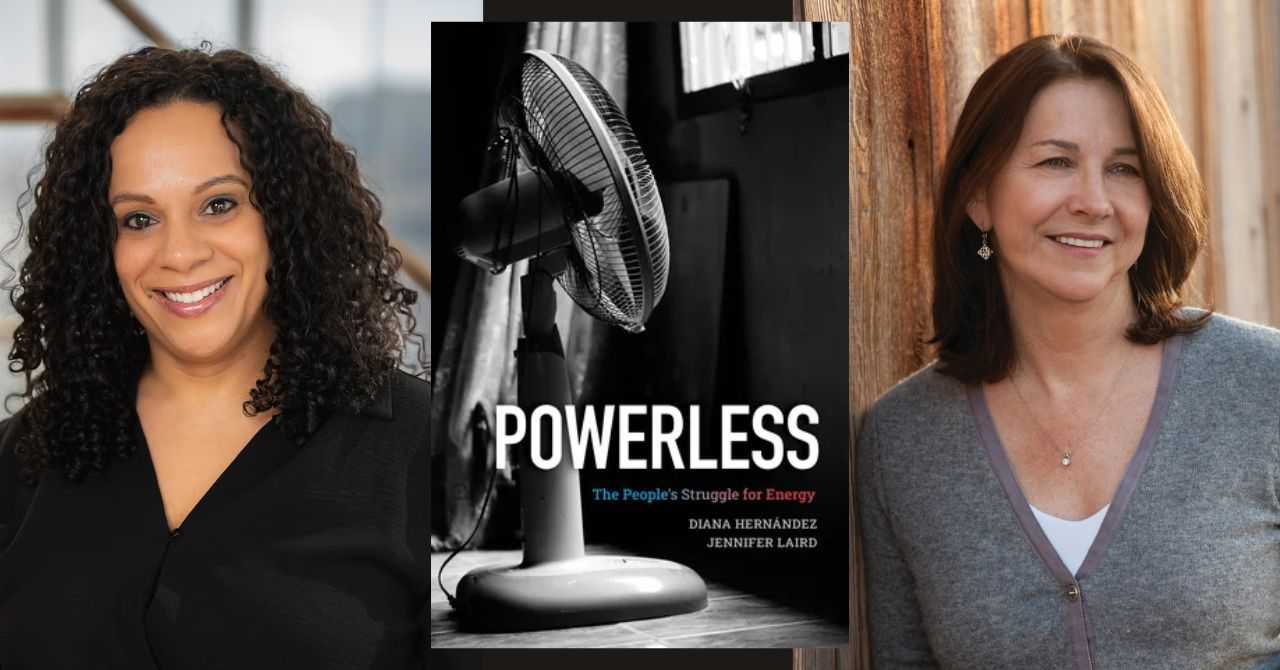- Cafe
- Bookstore
- Upcoming events
- Book an event
- Catering
- Institutional and bulk sales
- About Red Emma's
- Press
- Buy gift cards
- Red Emma's merch
- Donate to the Red Emma's Education Fund

Dr. Diana Hernandez presents "Powerless: The People's Struggle for Energy" in conversation w/ Green & Healthy Homes Initiative President & CEO Ruth Ann Norton
This event has already happened.
Energy serves as the lifeblood of our daily experiences. It permeates virtually every aspect of our existence, facilitating nourishment, safety, and productivity. When affordability threatens energy’s availability, a family’s living situation can become untenable—too cold, too hot, too dark, and too often, unhealthy and unsafe. In Powerless, sociologists Diana Hernández and Jennifer Laird reveal the hidden hardship of “energy insecurity” – the inability to adequately meet household energy needs.
Approximately one in ten households in the U.S. are energy insecure and four in ten are at risk for energy insecurity. These statistics alone do not convey the acute pain of utility shutoffs, or the relentless toll of chronic energy hardships marked by difficult choices and harsh living conditions. Drawing on survey data and interviews with one hundred energy-insecure individuals and families, Hernández and Laird detail the experience of energy insecurity. Individuals and families suffering from energy insecurity endure economic hardships, such as difficulty paying utility bills, utility debt, and disconnection from utility services. They also struggle with physical challenges, such as poor housing conditions and poor or dysfunctional heating and cooling systems. They are often forced to make difficult choices about what bills to pay. These decisions are sometimes referred to as “heat or eat?” choices, as families cannot afford to pay for heating and food at the same time. Energy insecure individuals and families employ a variety of strategies to keep energy costs down to avoid having to make these hard choices. This includes deliberate underconsumption of energy, enduring physical discomfort, and using dangerous alternatives such as open flames, ovens, or space heaters to try to maintain a comfortable temperature in their home. To be energy insecure is to suffer. Despite the heavy toll of energy insecurity, most people confront these difficulties behind closed doors, believing it is a private matter. Thus, the enormous social crisis of energy insecurity goes unnoticed.
Hernández and Laird argue that household energy is a basic human right and detail policies and practices that would expand access to consistent, safe, clean, and affordable energy. Their proposals include improving the current energy safety net, which is limited and often does not serve the most energy insecure due to stringent program requirements and administrative burdens. They also suggest redesigning rates to accommodate income, promoting enrollment and expansion of discount programs, reforming utility disconnection policies, improving energy literacy, and ensuring an equitable shift to renewable energy resources.
Dr. Diana Hernandez conducts research at the intersection of energy, equity, housing and health. A sociologist by training, her work examines the social and environmental determinants of health and has studied the impacts of policy and place-based interventions on the health and well-being of socioeconomically disadvantaged populations. Her foundational research on energy insecurity – defined as the inability to adequately meet household energy needs – has explored the multiple dimensions of this phenomenon identifying sociodemographic disparities, adverse consequences and promising interventions toward energy equity and justice. Much of her community-oriented research has been done in collaboration with community groups and government agencies around the country, including in the South Bronx, where she has led small-scale housing redevelopment projects. Dr. Hernandez has published over 75 peer-reviewed articles and book chapters in leading academic journals such as Social Science & Medicine, Journal of Urban Health and Energy Policy. Her work has been funded by the National Institutes of Health, the Department of Housing and Urban Development, and the JPB, Robert Wood Johnson, and Alfred P. Sloan Foundations, among others. Professor Hernandez teaches graduate level courses on qualitative research methods, design and analysis; public health leadership; and energy justice. She is a Mayoral Appointee to NYC's Environmental Justice Advisory Board. Dr. Hernandez has written for and been featured in various media outlets including the NY Times, USA Today, BBC, NY Daily News and CityLab.
Ruth Ann Norton is the President & CEO of the Green & Healthy Homes Initiative (GHHI). She has led its development into one of the nation’s foremost authorities on healthy housing and its impact on the social determinants of health. An expert on lead poisoning prevention, healthy housing, and the intersection of climate, energy and health, Ms. Norton directs GHHI’s national strategy to integrate climate, healthcare, and housing as a platform for improved health, economic, and social outcomes. Ms. Norton serves as a member of the EPA Children’s Health Protection Advisory Committee, the National Leadership Academy for the Public’s Health, the APHA Environmental Leadership Network, and the Johns Hopkins Bloomberg School of Public Health Center for Population Health Information Technology Advisory Board, among others. She is Chair of the Maryland Lead Poisoning Prevention Commission. Ms. Norton holds a degree in Economics from the University of North Carolina at Chapel Hill.

